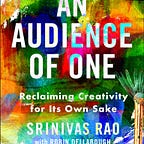What We’ve Learned from Building a Podcast That Has 450 5-Star Reviews
Since we started The Unmistakable Creative (formerly BlogcastFM in 2010) the show has received over 464 reviews. Of those 10, are not 5-star reviews. In some cases the reviews that weren’t 5-stars had nothing to do with the content, they were technical issues. And out of the 10 that weren’t 5 stars, most of them were 4-stars.
It’s clear that podcasting is experiencing a renaissance. New ones are starting every single day.
- Shaq has a podcast.
- Marc Maron just interviewed the president
- The folks at Gimlet have definitely got the world’s attention
But if you’re looking for a fast rise, and the opportunity to cash in, you might be in for a big disappointment.
1. Curiosity is a better Filter than Fame for Choosing Guests
About a month ago, I published a post on why interviewing famous people is a lousy growth strategy for growing your podcast. I’ve had a chance to interview some really “famous people”, Tim Ferriss, Seth Godin, and Scott Adams. But the people who really caused our audience to rave and grow were people like this blind artist, this bank robber, and this guy with 12 documented suicide attempts.
How do I find these people? I follow my curiosity. When a story makes its way across my newsfeed or tweet stream and it’s about a person who sounds interesting, I try to see where the trail leads.
Example: Somebody shared this video with the blind artist, John Bramblitt. Everything he paints is more beautiful than anything I’ve ever drawn in my entire life. Unless you’re a really skilled artist, it’s probably more beautiful than anything you’ve ever drawn. So I reached out to John. Chances are you haven’t heard him on every other podcast, and he’s not “making the rounds.” That’s why I was so interested in him.
2. Gaming the System is for Hacks
It can pay off being a hack. Given the depraved state of American culture, a slick dude can make millions being a hack. But even if you succeed, you lose, because you’ve sold out your Muse, and your Muse is you, the best part of yourself, where your finest and truest work comes from. — Steven Pressfield, The War of Art
Every one of our iTunes reviews is the byproduct of a connection, and an individual ask. None of them are from participating in review exchanges with other podcasters, or any attempts to “game the system”. One at a time may not scale perfectly, but at least it’s honest, genuine and true.
- When an author earns his or her Amazon reviews one at a time, it comes from work that connects, art that has an impact.
- When a podcaster earns his iTunes reviews one listener at a time, it’s based on genuine gratitude for the work. It comes from someone who truly felt changed by it.
This takes much longer than we’d like, but it pays dividends that can’t really be measure by any standard metric.
- There’s no way to quantify how much you touch someone’s heart.
- There’s no way to quantify the meaning you’ve created in someone’s life.
- There’s no way to quantify how much you’d be missed if you were gone.
And there’s no map, only a compass for this kind of work.
In a world driven by list sizes, open rates, tweets , and click throughs, things that can’t be measured create more value for more people every single day.
There are blog posts, portions of courses and entire courses dedicated to making it into New and Noteworthy in iTunes. Many of them involve “gaming the system” While gaming the system may temporarily put you into the New and Noteworthy category on iTunes, after your moment in the sun is over, you’ll have to do the hard work of building a tribe through trust, connection, longevity and depth. Podcasters leaving reviews for other podcasters artificially inflates rankings while also creating an echo chamber that keeps you from reaching a real audience…. Sorry to burst your bubble
3. Commit to the The Craft
Shows like Serial and the WTF podcasts aren’t reaching millions of listeners because of their great marketing. Marc Maron’s show reached 100 million downloads last year, but it’s worth noting that he started the show in 2009. That’s 6 years of commitment to the craft of podcasting. And who knows how many more years he put into the craft of comedy. The people who work at NPR have spent decades honing the craft of narrative journalism. You’d be a fool to look past the fact that Alex Blumberg was a producer of this American Life, before the success of Gimlet and Startup.
Mastery of a craft is something that comes from deliberate practice, longevity, and depth. So it’s worth asking if yourself if you’re up for that.
4. You Can’t Hide Shitty Art Behind Great Marketing (not for too long anyways)
You could become masterful at marketing the hell out of your podcast and even get it into the ears of thousands, possibly even hundreds of thousands of people. But you can’t hide shitty art behind great marketing for too long. In a world where there are 100,000 options shitty art that reaches an audience through great marketing won’t last too long. That audience won’t be too forgiving once they realize they’ve been had.
Those are just a few of the somewhat counterintuitive and possibly unpopular lessons that we’ve learned from building a podcast with over 450 5-star reviews.
I’m the host and founder of The Unmistakable Creative Podcast. Every Sunday we share the most unmistakable parts of the internet that we have discovered in The Sunday Quiver. Receive our next issue by signing up here.
